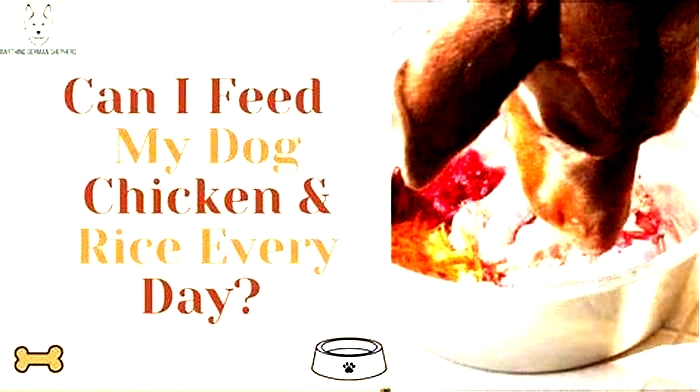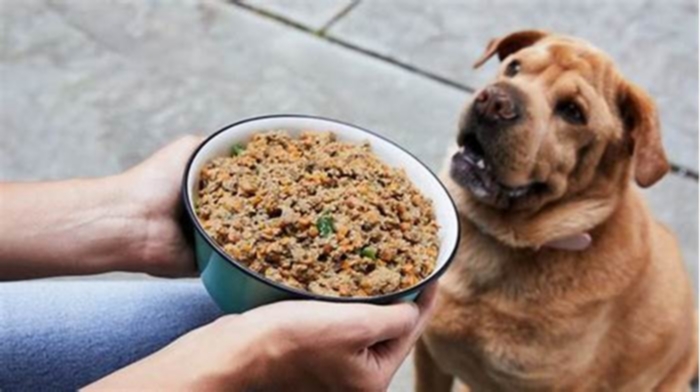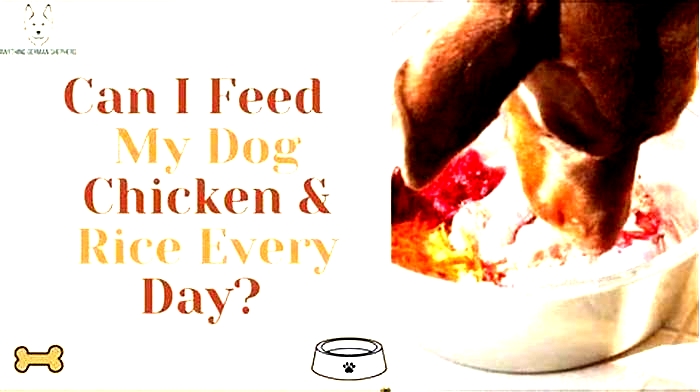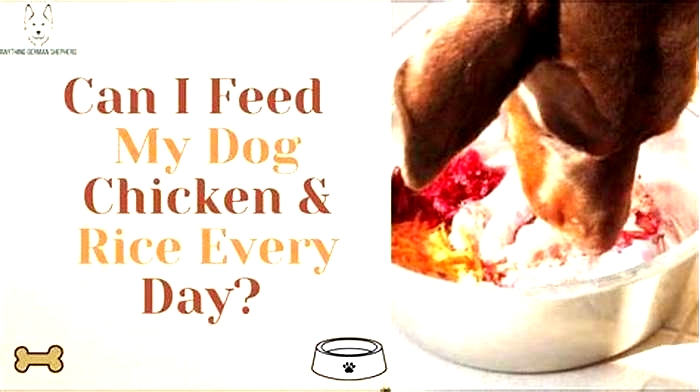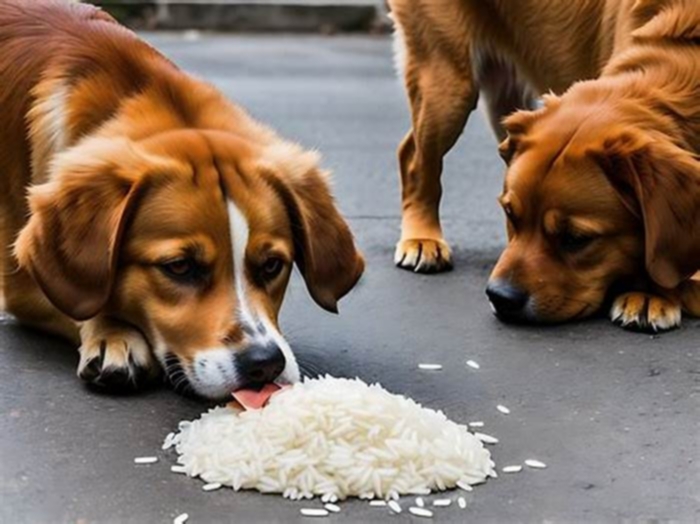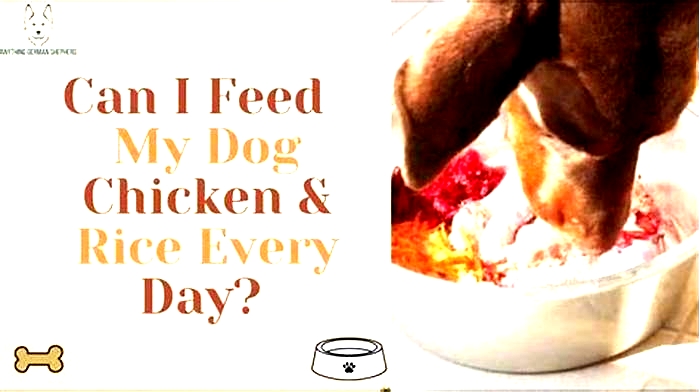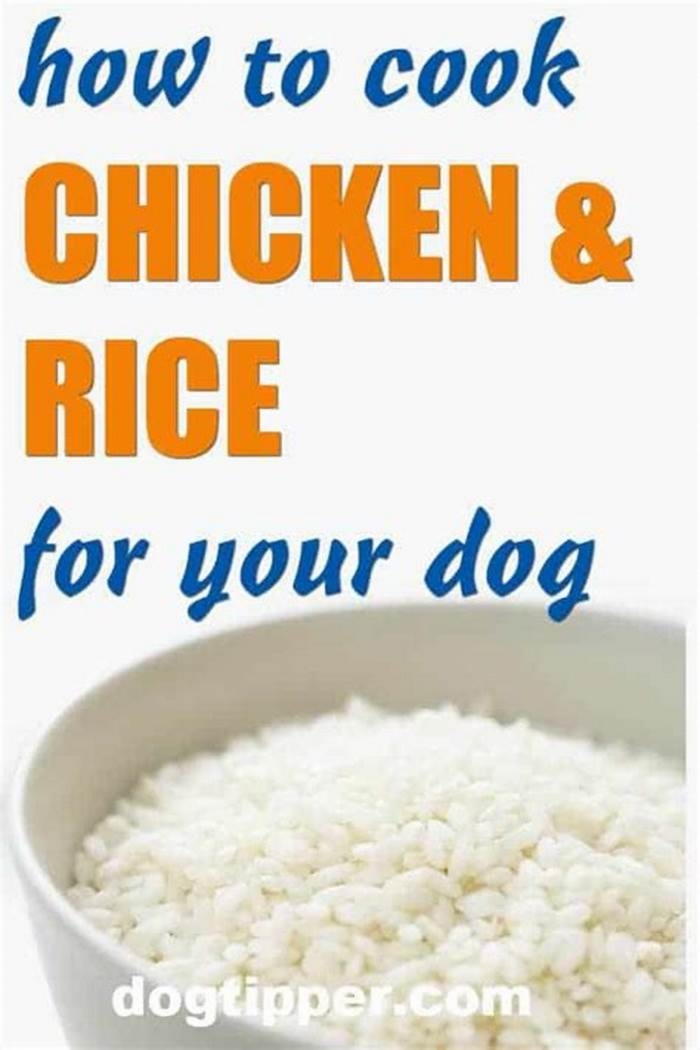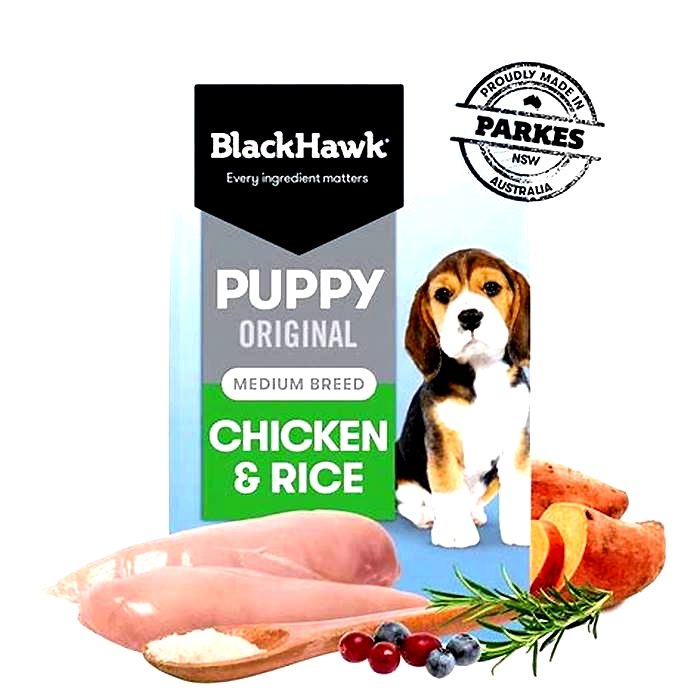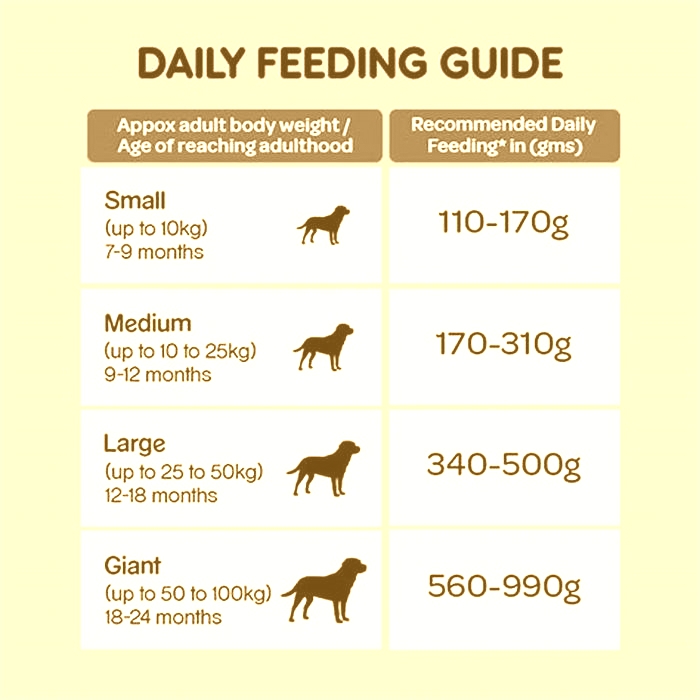Can puppies eat chicken and rice everyday
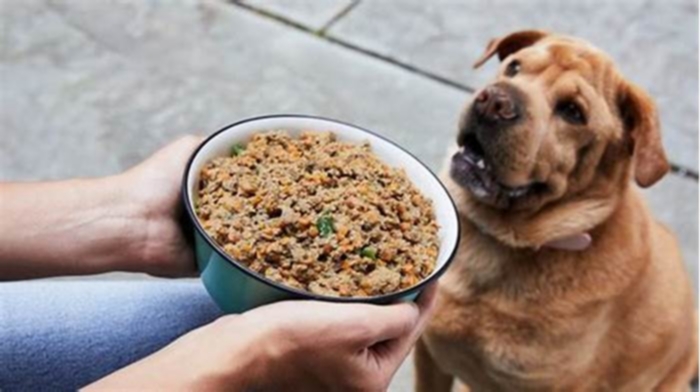
Can I Feed My Dog Chicken and Rice Every Day? (Solved!)
So, youve decided to pamper your pet with a home-cooked meal! Though chicken and rice might seem like an appealing everyday feast for your canine companion, especially if they have an upset stomach, trust me this simple dish alone wont cut it for meeting their nutritional requirements.
Avoid feeding your dog chicken and rice more than twice or three times a week. When you feed them chicken and rice, try to mix them in other vitamin-rich foods such as vegetables or some kibble.

Is Too Much Chicken And Rice Bad For Dogs?
Chicken and rice are not bad for your pet but your dog will need more than just these two foods. Chicken and rice are common ingredients in most home-cooked dog food recipes they are cheap, easy, and make a great bland diet option for dogs with upset stomachs.
Just as you need a balanced diet with some variety, your dog will also appreciate eating more than just chicken and rice.
Enhance your dogs meals with other wet foods beyond just canned food. Try adding vegetables, herbs, and other wholesome ingredients. Not only are you able to create an array of delicious recipes that taste great, but also one that is packed with essential nutrients for a balanced diet which will help keep your dog at a healthy weight!
Chicken And Rice For Dogs By Weight Chart
If youre considering making a meal of chicken, rice, and other ingredients for your dog, its important to keep the ratio of proteins and carbohydrates in balance according to their weight. Here is a handy guide that will help you do this:
| Weight | Chicken (cooken) | Rice (cooked) |
| <4 lbs | 1/4 cup | 1/8 cup |
| 4-7 lbs | 1/2 cup | 1/4 cup |
| 8-17 lbs | 3/4 cup | 1/3 cup |
| 18 26lbs | 1cup | 2/3cup |
| 27 35lbs | 1.25 cups | 3/4cup |
| 36 44lbs | 1.5 cups | 3/4cup |
| >45lbs | 2 cups | 1cup |
Remember to always adjust the portions based on your dogs individual caloric needs and consult with a vet if you have questions about their diet. Preparing a balanced home-cooked meal with the right ratio of proteins, carbohydrates, and essential vitamins and minerals is important in keeping your pet healthy!
Its also wise to add omega-3 fatty acids such as salmon oil or sardines to the meals for extra nutrition. This will help keep your pups coat shiny and their skin clear.
Can I Feed My Dog Boiled Chicken Every Day?
As long as you balance your dogs diet with additional ingredients, you can feed your pet a cup of food containing boneless chicken breasts and rice every day. For smaller dogs feed them less.
The boiled chicken alone will not sufficiently meet all of your dogs nutritional requirements.
Your dog will require additional fiber and carbohydrates, calcium, minerals, fatty acids, and various vitamins to help them maintain a healthy body weight.
If your pooch has recently been ill, its essential to amend its diet in order to replenish any nutrients that may have diminished.

Do Dogs Fully Digest Rice?
Dogs may be the descendants of carnivorous wolves but their stomachs have evolved to consume and digest some grains. However, they are not as capable of breaking down complex carbohydrates as humans or other animals. Therefore, you should be careful about what grains you feed your dog.
Canine stomachs are powerful enough to fully digest plain white rice boiled in chicken broth but avoid feeding your dog more fibrous varieties such as brown or red rice. Your dog will not be able to digest it and it could upset its gastrointestinal tract.

Will Chicken and Rice Give My Dogs Constipation?
Although chicken and rice provide a balanced meal for dogs, it is important to feed your pet the right amounts of both foods. Too much of either ingredient can cause issues such as constipation or diarrhea.
Its also essential to choose ingredients with high-quality proteins that are easy to digest, like lean chicken breast. Avoiding fatty meats, such as chicken skin and dark meats will also help prevent digestive issues.
What Can I Give My Dog Instead of Chicken and Rice?
If your dog has grown sick and tired of white rice, you can try mixing things up with a few other grains. (1)
Test out a few of these to see which ones your dog likes and can digest:
- Gluten-free oatmeal is a wonderful substitute for rice if your dog is grain tolerant
- If your dog has any allergies, tapioca works well as a grain-free carbohydrate (2)
- Boiled and mashed white potatoes contain complex carbohydrates and amino acids
- Bone Broth
- Baby food (without onions and garlic)
- Canned pumpkin and rice
If your dog struggles to digest any of these, do not feed them to your pet.

Are There Any Vegetables That I Shouldnt Give My Dog?
Avoid feeding your dog onions, garlic, chives, mushrooms, tomatoes, asparagus, or leaks. Onions, leeks, chives, and garlic are all part of the same plant family, and all of them are bad for your dogs health. They can cause gastrointestinal inflammation and poison your dogs blood.
While not all mushrooms are bad for dogs, many species of wild mushrooms are highly toxic. Feeding your dog mushrooms will teach it to trust all mushrooms, leading it to eat toxic ones.

Can I Replace Chicken with Tuna in My Dogs Food?
You can replace chicken with a variety of different meats. Tuna is completely safe for your dog but avoid making it their main source of protein. Tuna often has high mercury levels that can damage your pets health and lead to long-term health problems.
You can also use cubed or ground beef, turkey, or liver (in small portions), as long as you cook the meat to kill any bacteria that could harm your dog.
Should I Mix Kibble with Chicken and Rice?
If your dog is new to a home-cooked diet, its stomach may still be adjusting to new foods. You can mix kibble into their homemade meals to provide more fiber, calories, and nutrients they need to survive.
Your vet may also recommend adding kibble into their meals to round out their diets. Often, it is difficult for pet owners to meet all of their dogs nutritional needs, so adding kibble can help lighten that burden.
What Homemade Foods Can Dogs Eat?
You may be surprised to learn that your dog can eat a wide range of human foods without it harming their health. Your dog can safely and happily consume:
- Vegetables such as carrots, peas, spinach, and zucchini
- Lean meats such as chicken, turkey, and ground beef
- Some legumes such as kidney beans
- Grains such as oatmeal, rice, and tapioca
As long as your home-cooked meals meet all of your dogs nutritional needs, theres no harm in switching to a homemade diet.
Is Homemade Dog Food Good for Dogs?
Although scientists have yet to publish any research on whether homemade dog food is better than store-bought dog food, there is reason to believe it is better for them. One study found that dogs raised on a home-cooked diet lived 3 years longer, on average than dogs raised on kibble.
Additionally, you can better control what your pet is eating and regulate their diet if they have any allergies or a sensitive stomach.
My name is Ken and Im one of the staff writers at Petloverguy.com. Ive cared for pets most of my life starting with hamsters, turtles, and snakes. Then moving up to parakeets, guinea pigs, and even ducks.I currently live with two yorkies and a chihuahua mix.
Can Dogs Eat Chicken?
Considering how many dog foods contain chicken as an ingredient, its a safe bet that you can feed your dog chicken. In fact, its a good source of protein, and cooked chicken can even be substituted for or added to his regular meal.
Most sources recommend against raw chicken, due to the risk of salmonella or bacterial infections, although the movement toward raw food, including raw chicken and raw chicken bones, is growing. But if youre not sure about raw food diets, any unseasoned roasted, poached, grilled, or baked chicken can be served on its own, mixed with your dogs regular meal, or served as a treat. You can even mix it with a healthy grain, and a vegetable such as string beans or other vegetables safe for dogs, for a special homemade dinner.
There are two things to be aware of before serving your dog chicken.
- Some dogs are allergic to chicken, and it ranks among the top 10 allergy-inducing ingredients. The most common allergens are beef, dairy, wheat, egg, chicken, lamb, soy, pork, rabbit, and fish.
- Be sure to take cooked chicken off the bone. Cooked chicken bones splinter easily, which can cause choking or a gastrointestinal tract puncture
If youve determined that your dog happily and healthily eats chicken, go ahead and let them enjoy it. And, just for fun, try these homemade, vet-approved chicken recipes for dogs: a yummy mini omelette or frozen chicken treat.
Learn more about human foods your dog can and cant eat.
Can Dogs Eat Rice?
One of the most popular foods around the world is rice. But can dogs eat rice? The answer is yes. Rice is an ingredient sometimes found in commercial dog foods.
Many pet owners feed white rice to their sick dog. One of the reasons white rice is the chosen grain for a dog with an upset stomach is that its easy to digest, quick to prepare, and low in fiber.
We use rice as a carb source when dogs are on a bland diet after a GI upset, says Dr. Steve Weinberg, DVM and medical director/CEO of 911Vets, a mobile veterinary service in the Los Angeles area. Rice helps to bind the stool in cases of diarrhea.
Is All Rice the Same?
Brown rice is never prescribed for dogs having gastrointestinal issues, such as diarrhea. Ill canine companions need need the starch in white rice. However, white rice has a higher glycemic index than brown rice and can cause blood sugar levels to rise. If your dog is diabetic, you can still feed them a little white rice, if needed, but not on a consistent basis.
Brown rice can be harder for a dog to digest because it is not as processed. Brown rice has a seed coat where the nutrients are stored, explains Dr. Carly Fox, DVM, a staff veterinarian at New York Citys Animal Medical Center. That coat is missing from white rice, resulting in less nutritional content.
Carbohydrates are an important part of a dogs diet, along with a certain amount of protein and fat. Just as with humans, eating too many carbs can lead to weight gain in a dog. Because commercially produced dog food contains carbohydrates, be careful not to overload your pup with additional high-carb foods like rice. As long as your dog is maintaining a healthy weight, adding some rice to your dogs mealsis perfectly fine.
When preparing rice for your pup, boil it in water and do not add any seasonings or spices, which can upset stomachs or even be toxic. Keep it plain and simple; they wont know the difference. And just like with any new food you introduce into your dogs diet, consult your veterinarian first and then start off slowly.
Paws & Pecks: The Ultimate Guide to Chicken for Your Puppy!
Hey there, fellow pet lovers! Today, were diving into a question thats been on many puppy parents minds: At what age can puppies eat cooked chicken? So, grab a cup of your favorite beverage, cozy up with your furry friend, and lets embark on this flavorful journey together!
Chicken 101: When Can Puppies Start Clucking Away?
Introducing new foods to your puppys diet is an adventure filled with tiny steps and big leaps of excitement. Cooked chicken, a protein-packed favorite among canines, is no exception. But timing is everything! Heres a table chart thatll give you a snapshot of when to introduce cooked chicken into your puppys diet:
| Puppys Age | Cooked Chicken | Notes |
|---|---|---|
| 0-8 weeks | Stick to mothers milk or formula. | |
| 8-12 weeks | Small, bite-sized pieces. | |
| 3-6 months | Increase quantity gradually. | |
| 6+ months | Regular part of diet if tolerated. |
Why Wait? Understanding the Chicken Timeline
You might wonder, Why the wait? Cant my pup start enjoying chicken right away? Great question! Introducing cooked chicken (or any solid food, for that matter) too early can be tough on your puppys developing digestive system. Plus, their early nutrition should primarily come from their mothers milk or a high-quality puppy formula, which provides the essential nutrients for growth and development.
Tips for Chicken Treats: Safety First!
Cooked chicken can be a fantastic treat and a great source of protein for your pup. However, there are some golden rules to follow:
- Bone Beware: Never feed your puppy chicken bones (cooked or raw), as they can splinter and cause serious health issues.
- Spice is Not Nice: Ensure the chicken is plain and unseasoned. Spices and seasonings can upset your puppys stomach.
- Quality Counts: Opt for high-quality, lean chicken breast to avoid any potential health problems associated with fatty foods.
Making the Introduction: Party in Their Tummy
Introducing cooked chicken to your puppy should be a gradual and exciting process. Start with a tiny amount to see how they react. If theres no adverse reaction (like allergies or digestive upset), you can slowly make it a regular part of their diet.
Final Bark: Tail Wagging Goodness
Cooked chicken can be a healthy and delicious addition to your puppys diet when introduced properly. Its not just about treating them to something tasty; its about ensuring theyre getting the right balance of nutrients to grow strong and healthy.
Remember, every puppy is unique, and what works for one may not work for another. Always consult with your vet before introducing new foods into your puppys diet. Now go ahead, share that clucking goodness with your furry friend, and watch them grow into a happy, healthy dog!
We hope this guide has helped clear up any confusion and made the journey to introducing cooked chicken into your puppys diet a bit easier and a lot more fun. Stay tuned for more insights and tips on making your pets life as wonderful as they make yours!
Comment 1: Is it okay to mix cooked chicken with my puppys regular food?
Absolutely! Blending cooked chicken with your puppys usual meals can be a delightful way to enhance their diet with extra protein and flavor. This mix can also encourage picky eaters to show more interest in their meals. Start with a small proportion of chicken to their regular food to prevent any digestive upset. Its essential to ensure the chicken is finely chopped or shredded to avoid any choking hazards for your little furball. This method also helps in gradually introducing new tastes and textures to your puppys palate, making mealtime an exciting adventure.
Comment 2: How often should I feed my puppy cooked chicken?
Feeding frequency of cooked chicken to your puppy should be moderated to maintain a balanced diet. Think of cooked chicken as a supplement rather than a staple; a couple of times a week is a good starting point. Its vital to consider the chicken as part of their daily protein intake and not an addition to it. This approach prevents overloading their diet with protein, which can strain their developing kidneys and lead to imbalances in their nutrition. Always aim for a diversified diet to ensure they get all the necessary vitamins, minerals, and nutrients for optimal growth and health.
Comment 3: Can cooked chicken cause allergies in puppies?
Yes, while its rare, some puppies can develop allergies to chicken. Signs of an allergic reaction include itching, skin rash, ear infections, and gastrointestinal issues such as vomiting or diarrhea. If you notice any of these symptoms after introducing cooked chicken, its crucial to remove chicken from their diet and consult with your veterinarian. They might recommend an elimination diet to pinpoint the exact cause of the allergy. Remember, an allergic reaction can emerge over time, so its important to monitor your puppys health and behavior closely when introducing any new food.
Comment 4: Are there any breeds that should avoid chicken?
Most puppies can safely enjoy chicken as part of a balanced diet. However, certain breeds prone to food sensitivities or allergies, such as Cocker Spaniels, Labrador Retrievers, and Bulldogs, might require closer monitoring. Its not that these breeds should avoid chicken altogether, but rather, their owners should be more vigilant for signs of food-related issues. If you have a breed known for sensitivities, introduce cooked chicken gradually and in small amounts. Observing your puppys response over several days will help you determine if chicken suits their diet or if you should consider alternative protein sources.
Comment 5: Can I give my puppy chicken broth?
Chicken broth can be a tasty and hydrating treat for puppies, especially if theyre picky drinkers or need encouragement to stay hydrated. However, its crucial to use broth thats free from onions, garlic, and excessive salt, as these can be harmful to dogs. Ideally, prepare a simple broth using just chicken and water, avoiding any added spices or seasonings. Besides being a hydrating treat, chicken broth can also soothe upset stomachs and provide additional nutrients. Its a comforting addition to their diet, particularly during colder months or when theyre feeling under the weather. Just like with solid foods, introduce broth slowly and in small quantities to ensure it agrees with your puppys digestive system.
Comment 6: Whats the best way to cook chicken for puppies?
When preparing chicken for puppies, simplicity is key. The ideal method is boiling or steaming chicken breast without any added salt, spices, or oil. These cooking methods preserve the natural nutrients in the chicken while ensuring its easily digestible for your puppy. Before serving, ensure the chicken is cooked thoroughly to an internal temperature of 165F (74C) to eliminate any harmful bacteria. Once cooked, let it cool down, then finely shred or chop the chicken into small, manageable pieces for your puppy to prevent any choking hazards. This approach ensures that the chicken retains its nutritional value while being safe and appealing for your puppy to eat.
Comment 7: My puppy loves chicken, but how do I know if its getting too much protein?
Monitoring your puppys protein intake is crucial for their overall health, especially when feeding them high-protein foods like chicken. Signs that your puppy might be consuming too much protein include increased thirst and urination, digestive upset, and in some cases, more serious conditions like kidney strain. A balanced diet for a puppy should consist of about 22-32% protein on a dry matter basis for normal growth. Its important to consult with your vet to understand your specific puppys dietary needs based on their breed, size, and activity level. Adjusting their diet to ensure a balanced intake of proteins, fats, and carbohydrates will promote healthy growth and development.
Comment 8: Can cooked chicken help with my puppys coat and skin health?
Absolutely, cooked chicken can be beneficial for your puppys coat and skin health due to its high content of essential amino acids and omega-6 fatty acids. These nutrients are vital for maintaining healthy skin and a shiny, lustrous coat. The amino acids in chicken help produce keratin, a protein that is a key structural component of hair and nails. Meanwhile, the omega-6 fatty acids promote skin health by improving the skins barrier function. To maximize these benefits, ensure the chicken is prepared simply without any harmful additives, and always serve it as part of a balanced diet to support overall health and well-being.
Comment 9: Is there a difference in nutritional value between white and dark chicken meat for puppies?
Yes, there is a nutritional difference between white (breast) and dark (thighs and legs) chicken meat that can affect your puppys diet. White meat is lower in fat and calories but high in protein, making it an excellent choice for a lean protein source. Dark meat, on the other hand, contains more fat and calories but also higher levels of certain nutrients, such as iron, zinc, and B vitamins, which are crucial for your puppys development. While both types of meat can be part of a healthy diet, its important to balance them with your puppys overall nutritional needs in mind. Puppies with higher energy requirements may benefit from the additional nutrients found in dark meat, while those needing a leaner diet may do better with white meat.
Comment 10: How can I incorporate chicken into my puppys training routine?
Chicken can be an effective and healthy treat to use during your puppys training sessions due to its high palatability and nutritional value. To incorporate chicken into training, cook and prepare the chicken as recommended (boiled or steamed without any seasonings), then cut it into tiny, pea-sized pieces. These small pieces make perfect low-calorie rewards that wont fill your puppy up too quickly during training sessions. Using cooked chicken as a training treat can help keep your puppy motivated and focused on the tasks at hand. Always remember to account for these extra calories from treats in their daily caloric intake to maintain a balanced diet.
HELP US PUT FOOD ON THE TABLE

